- Home
- Iris Murdoch
The Black Prince Page 2
The Black Prince Read online
Page 2
As her journals record, Murdoch struggled throughout her life against her own egoistic tendencies, and especially with erotic desires that included a need to cause mystification and achieve control. For someone with such a tumultuous inner world, the muscular choice-is-all school of philosophy could not possibly be satisfactory. Murdoch felt that we would only get to the right choices if we understood better the inner forces militating against goodness. And in her view, the main such force was our inability to see other people correctly. We are always representing people to ourselves in self-serving ways, she believed, ways that gratify our egos and serve our own ends. To see truly is not the entirety of virtue, but it is a very crucial part. And even where a person makes good choices, if the inner vision is lacking, then an important part of virtue itself is lacking. (Here she agrees with Aristotle: there is a morally large difference between self-control and real virtue, even though the overt acts may look exactly the same, because the self-controlled person has not yet achieved the motives, reactions, and patterns of seeing characteristic of the good person.)
To make this point clear for philosophers, Murdoch invented an example that has by now become famous. In her lecture “The Sovereignty of Good,” she asks us to imagine a mother-in-law, M, who has contempt for her daughter-in-law, D. She sees D as common, cheap, low. Because M is a very self-controlled Englishwoman, she behaves, let us stipulate, with perfect graciousness all the while, and no hint of her real view surfaces in her acts. But she realizes, too, that the very feelings and thoughts she has are unworthy, very likely to be generated by jealousy and a too-keen desire to hang on to her son. So she sets herself a moral task: she will change her view of D, making it more accurate, less marred by selfishness. So she sets herself exercises in vision. Where she is inclined to say “coarse,” she will say, and see, “spontaneous.” Where she is inclined to say “common,” she will say, and see, “fresh and naïve.” As time goes on, the new images supplant the old, and she now does not have to make such an effort to control her overt actions: they flow naturally from the way she has come to see D.
Murdoch claims simply that this change is of some moral significance. Getting the behavior right is one good thing; but getting the thoughts and emotions right is another, and in some ways a deeper, more fundamental, good thing. She challenges moral philosophy to attend more to these long-term tasks in vision and self-cultivation, to focus on patterns of character that extend over a life rather than simply on isolated moments of choice.
There are gaps in Murdoch’s philosophical vision. Surprisingly in someone with a past of political commitment, she seems almost entirely to lack interest in the political and social determinants of a moral vision, or of an aspect of social critique that ought, one feels, to be a major element in the struggle against one’s own defective tendencies.
Another problem is the tension between Murdoch’s Platonism and her vision of particulars. Murdoch keeps on suggesting that “The Good” is a unitary abstraction of some kind, even while all her writerly instincts work in the direction of showing its irreducible many-sidedness and kaleidoscopic variety. This tension is never fully resolved, either in the essays, where it simply sits there generating difficulty, or in the novels, where the novelist’s rich vision of the particular sets the agenda, and yet characters whom the author appears to admire keep on talking what sounds like nonsense about The Good.
Finally, there is an acute problem about action. Hare’s vision of life is incomplete; but it contains much that matters greatly. As the post-war generation knew, action does matter, and at the end of the day, if one resists tyranny and saves the lives of the innocent, who cares if one was saying all the while “coarse,” “common,” or, more virtuously, “spontaneous,” “fresh”? Murdoch is so preoccupied with goings-on in the inner world that she seems almost to have forgotten about the difference that action can make. The obsession with one’s own psychology that results can look strangely like egoism in a world where a forthright commitment to action can make the difference to countless people who are suffering, no matter whether the intentions of the agent are pure.
In The Black Prince, however, these problems do less damage than they do elsewhere. The inner drama of erotic love is realized with such moving completeness that the problem of underdescribed social context does not loom large. The problem of social action is actually transcended to some degree: for the novel is a murder story as well as a love story. Narrated by Bradley from prison, it is framed by his choice to accept responsibility for a crime he did not commit, but perhaps caused. And the deeply sad reappearance of an adult Julian at the novel’s end makes questions of choice and action central, as we see what Bradley’s erotic decisions have meant for another person’s life. Finally, the problem of Platonism versus many-sided reality is transcended as well as Murdoch ever transcends it. As befits a love story, the reader is continually confronted with the sensuous textures of things and the surprising unexpectedness of individuals, even while those individuals also raise large general questions. Nor is The Good very much on display. Fortunately for the novel’s coherence, characters are far more worried about particular vices and virtues.
Let us now return to Bradley and Julian. There are, as I have said, many indications in the novel that Bradley has the Murdochian vice of blinding egoism, that his love is a fantasy. Although love initially makes him overflow with feelings of love and generosity toward everyone else in his surroundings, these generous feelings are quickly supplanted by the pain of anxiety, by jealousy and possessiveness, and especially, after the two arrive at the country retreat, by overwhelming and obsessive concern about sexual performance. The novel lets us see clearly that this last concern does indeed blind Bradley to important truths about his world. In the grip of the idea that he must finally make love successfully to Julian, he allows himself to conceal from Julian, and to distance from his own thoughts, the news of his sister Priscilla’s suicide, a death for which he is in part responsible because of the neglect induced by his passion. He does not think seriously enough of Julian’s real emotions to recognize that she will be devastated and profoundly shocked when she realizes that she has been making love to a man who has just received the news of his sister’s death, but who has concealed it in order to go to bed with her. Anxiety and vanity do, here, defeat the real vision of the beloved. Nor does Bradley recognize the importance to Julian of his other lie, about his age. (He says he is in his forties, rather than fifty-eight; when her father reveals the truth, her romantic attraction to Bradley is seriously undercut, though whether more by the lying or by the truth it is hard to say.)
Furthermore, the four narratives at the novel’s end all convict Bradley of various forms of egoistic illusion. For Christian, Bradley is a humorless Puritan whose infatuation with Julian was a crude attempt to conceal from himself the fact that he was really in love with Christian. As for the love between them, “it was obviously mostly in his mind” (387). For Francis Marloe, the psychoanalyst, Bradley’s story is just one more confirmation of the truth of Freudian theory. Bradley is in the grip of a childhood ambivalence toward his mother, passionately desiring her but also hating her for her infidelity to him; therefore he fears women and is homosexual. The fact that he is physically most aroused by Julian when she is dressed up as Hamlet is just one detail that confirms, for Francis, the essential truth that Bradley is pursuing a childhood fantasy. For Rachel, Bradley is plainly in love with her all along. His story about Julian is just a silly fiction, “His great ‘passion’ for her is a typical dream-up” (397), resulting from a sadomasochistic fantasy of doom and separation. For Julian, now married to the teenage boyfriend with whom she had just broken up before the affair with Bradley, there was something like love between them, but it is a great mistake on Bradley’s part to think that eros can reveal the truth. “Love is concerned with possession and vindication of self,” Art with “truth in its least pleasant and useful and therefore most truthful form” (402). Eros is thus a corrup
ter of art, incapable of telling truth. His words therefore cannot truthfully describe the love between them.
These are the doubts. Now we must consider the other side of the ledger. We should notice, first, that Bradley’s claims for the truth and value of erotic vision are claims that Murdoch makes in her own voice, with similar allusion to Plato, in Metaphysics as a Guide to Morals: Love, as the fruit and overflow of spirit. Plato’s visions may seem far away from the mess of ordinary loving, but they shed light, we can understand. Falling in love is for many people their most intense experience, bringing with it a quasi-religious certainty, and most disturbing because it shifts the centre of the world from ourself to another place. A love relationship can occasion extreme selfishness and possessive violence, the attempt to dominate that other place so that it be no longer separate; or it can prompt a process of unselfing wherein the lover learns to see, and cherish and respect, what is not himself. There are many aspects to this teaching; for instance, letting the beloved go with a good grace, knowing when and how to give up, when to express love by silence or by clearing off. This negative heroism may be very enlightening, aided by the palpable satisfaction of having behaved well when one desired to behave otherwise!
Here Murdoch grants that erotic love has a potential for violence and extreme selfishness; but she insists that it is also the greatest source many people can ever have of an experience of being forced out of their own ego, by the sheer blazing power of another person, toward the vision of something true outside the self. Nor is this an isolated passage. In another novel of the same period, The Sacred and Profane Love Machine, a similar reflection occurs, not in the thought of any particular character, but, so to speak, in the author’s own voice. These passages suggest that we ought to see Bradley Pearson as a more complex figure than the pathetic self-deluded character depicted by the four postscripts.
And indeed, to the reader of the entire novel, it is really the four postscript writers, rather than Bradley, who emerge as deluded egoists. Thoroughly obsessed with the self, they each misrepresent the world in quite comical ways. (When we say “misrepresent,” we are, of course, trusting Bradley, but then he gives us so much more, in terms of human vision and insight, than the flat worlds of the postscripts. These narratives are so thin, so transparently self-serving, that they just cannot be true: they wear their egoism on their face.) Christian, while in some ways generous and full of an admirable energy, is vain and mercenary, totally lacking in any sense of the spiritual side of life. Her incomprehension about the value of art betrays her; and her comic conviction that Bradley is in love with her betrays her further. Francis is moving in his affection for his old friend, but he sees the world through the lens of a simplifying universal theory, always a Murdochian vice; for this reason he cannot really comprehend the complex reality of an individual person. Rachel has staked her whole life on a series of lies about Bradley and herself. The closest we get to thoroughgoing evil in this novel is in characters like Rachel, so profoundly deceptive and self-deceptive that the reality of other people simply ceases to exist for them. As Bradley observes, evil is rarely the result of a “conscious leering evil intent.” Much more often it is “the product of a semi-deliberate inattention, a sort of swooming relationship to time” (181).
Of the four narrators, Julian is the saddest, so shell-shocked by the events involving her mother, father, and lover that she has retreated from people into a kind of austere antierotic art that cannot, we feel (and Loxias confirms), be very much good as art. So, rather than undercutting Bradley, the poverty of the four Postscripts actually illuminates, by contrast, all that is rich, generous, and true in the vision of the world from which most of the novel is narrated.
When we return to Bradley with this contrast in mind, we discover that much of his story enacts, in fact, the story of the lovers in Plato’s Phaedrus. For years, the center of Bradley’s world has been himself: his sterility as an artist, his envious friendship with Arnold Baffin, the successful popular writer. His passion for Julian opens his eyes and allows his art, ultimately, to see truth—as the mysterious editor of his manuscript remarks, vindicating Bradley against the older Julian’s denunciation of the erotic element in art. “Of course it [sc. art] is to do with truth,” Loxias writes, “it makes truth. But to that anything can open its eyes. Erotic love can” (406). Anxiety and envy have closed Bradley in, but passion opens his eyes, permitting him to see the other characters in the variegated and richly human way in which they appear before us.
In fact, as he looks back on his love, Bradley persuasively articulates a very Platonic and also a very Murdochian theory of vice and illumination that seems a pretty good explanation of what happens to him. In general, he argues, we do not see others truly. Our anxious personal emotions “cloud the view, and so far from isolating the particular, draw generality and even theory in their train” (73). Egoistic anxiety is the root of all the vices (175). Because of anxiety, Bradley suggests, we cannot see other particular people too precisely; their sharp particularity would be too threatening, would give us too much pain. We therefore “defend ourselves by descriptions and tame the world by generalizing” (74). This crude vision of people and things is an essential prelude to evil: “When we do ill we anaesthetize our imagination. Doubtless this is, for most people, a prerequisite of doing ill, and indeed a part of it” (162). In general, the mind of an everyday human being is like one of the souls in Plato’s cave, nourished by comforting shadows (184, 200, 277). (We are clearly to connect this insight with the comic description of the novels of Arnold Baffin, crude melanges of philosophical theory and exotic generality.)
Love, Bradley now argues, is for most people the only force powerful enough to break the grip of the anxious ego. The lover is “dazzled by emergence from the cave” (200). In the blinding joy of the vision of beauty, the lover attains a wonderful loss of self, and something like the regrowing of the wings that Plato’s Phaedrus describes. Erotic love gives Bradley wings of joy, a sense of the blotting out of self, a turning away from customary fears. The contemplation of the beloved is an end in itself (236).
Now of course anxiety may, and does, arise in the context of love. The self more or less inevitably returns, revives (201, 236). In fact, “The presence of the loved one is perhaps always accompanied by anxiety” (230). But, continues Bradley, “this one grain of darkness cannot be accounted a blemish. It graces the present moment with a kind of violence which makes an ecstasy of time” (230). Anxiety and love are antagonists, not accomplices, and love is the only force powerful enough to prevail against the anxious ego. Because we are imperfect, the triumph of love, and its vision, are also imperfect. Bradley’s love is, in this way, marred by jealousy, by sexual anxiety, and by a failure to imagine Julian’s distress at Priscilla’s death.
Nonetheless, it is evident that Bradley is freed from egoistic self-preoccupation, to the extent to which he is, thanks only to the intensity of his desire, not in spite of it. His experience of love does include the virtuous actions Murdoch names—letting the beloved go with good grace, knowing when to give up, behaving well when one wishes to behave otherwise. In fact, although he does not praise himself, we understand well that love has brought him to a virtuous action extreme in its consequences—for it is clearly for Julian’s sake that he conceals the true facts concerning her mother’s murder of her father, and takes the conviction and sentence with staggering courage. It is also thanks to love that he becomes a real artist: for we are to think that the manuscript we read is his first humanly rich and truly perceptive work of art. It is subtitled “A Celebration of Love,” and its editor, P. A. Loxias, is a proxy for the god Apollo himself. (Loxias is one of Apollo’s common epithets.)
There are certainly doubts about the vision inherent in Bradley’s love. We wonder, for example, how truly he sees Julian, when he sees her as a “divine form straying among mortals.” The fact is that she is a confused adolescent girl, in some respects very ordinary. So, is he seeing
her, or is he seeing through her to something general that she merely instantiates? These are worries about Plato and Murdoch’s Platonism, however, not doubts about the extent to which The Black Prince is, indeed, Platonic. And surely, Bradley would reply, to see the divinity in Julian is a truer sort of vision than the cramped mean-spirited vision of Rachel and Arnold Baffin, who treat her dismissively as an ordinary not very interesting girl. Love sees truly, in part, because it does see divinity rather than the muddled everyday.
Surely, then, despite all the imperfections of Bradley’s love for Julian, the Platonism of Murdoch’s “Celebration” of the erotic has the last word. In her postscript, Julian, grown older but hardly wiser, expresses an anti-Platonic view: true vision is “very very cold.” “Erotic love never inspires art. Or only bad art.” “Love is concerned with possession and vindication of self. Art with neither. To mix up art with Eros, however black, is the most subtle and corrupting mistake an artist can commit” (402). Love, she argues, is inherently narcissistic, antithetical therefore to the outward-reaching, truth-directed vision of good art (403). This view of the world and of Bradley Pearson is, however, repudiated—first of all, internally, since the self-conscious arty prose of Julian Belling rings false, gives us the sense of a stunted personality and imagination. More important, it is repudiated by Loxias himself, who makes fun of her “very literary piece,” and asserts that erotic love can open the lover’s eyes to the truth.
But now we arrive at a deep problem: that of the relationship of erotic love to the erotic work of art. For this is a love story, to be sure. But it is also, very self-consciously, an art story, whose culmination is not the love itself, but the turning of love into art. And although there may be Platonism and Platonic vision in the love story, it is Bradley the artist who very artfully constructs his story as a Platonic story. The theme of art’s relationship to life is signaled to us again and again—by casting Bradley as a blocked and unsuccessful writer for whom Eros opens the door to erotic expression, by the constant self-conscious allusions to the process of narrating his life story, by his Foreword, with its literary self-consciousness about style and form, and, above all, by the Editor’s Foreword and Postscript, which are given authority by the name of the mysterious editor. One of the worries we have about Bradley’s love is a worry about the literary artfulness with which it is narrated: can anything this carefully constructed actually contain a loving vision of a particular beloved?

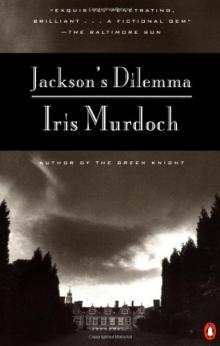 Jackson's Dilemma
Jackson's Dilemma The Flight From the Enchanter
The Flight From the Enchanter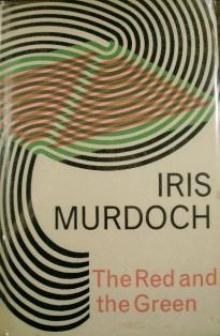 The Red and the Green (Vintage Classics)
The Red and the Green (Vintage Classics)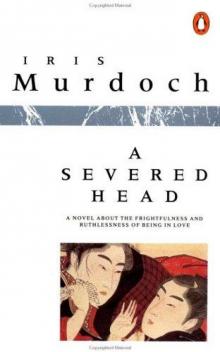 A Severed Head
A Severed Head The Black Prince
The Black Prince The Nice and the Good
The Nice and the Good The Unicorn
The Unicorn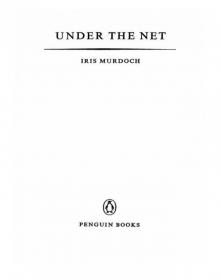 Under the Net
Under the Net The Italian Girl
The Italian Girl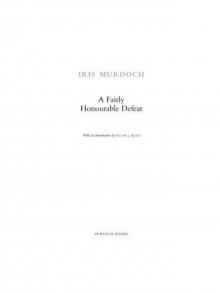 A Fairly Honourable Defeat
A Fairly Honourable Defeat An Accidental Man
An Accidental Man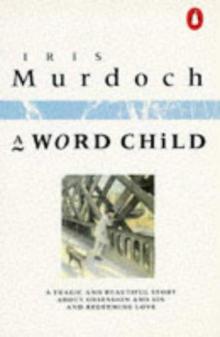 A Word Child
A Word Child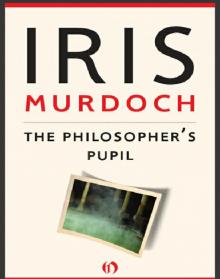 The Philosopher's Pupil
The Philosopher's Pupil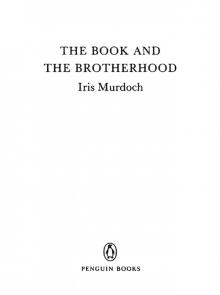 The Book and the Brotherhood
The Book and the Brotherhood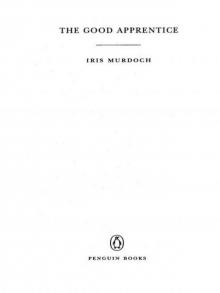 The Good Apprentice
The Good Apprentice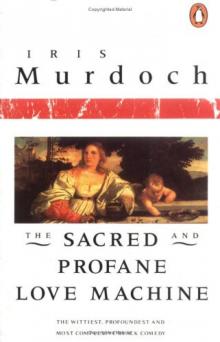 The Sacred and Profane Love Machine
The Sacred and Profane Love Machine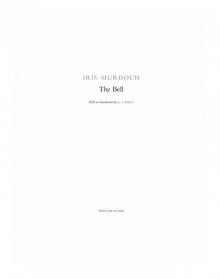 The Bell
The Bell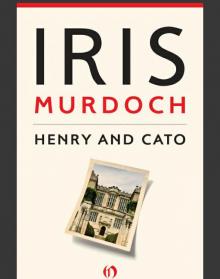 Henry and Cato
Henry and Cato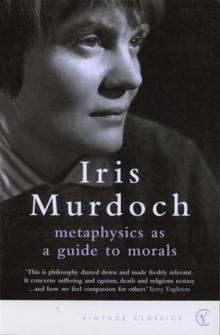 Metaphysics as a Guide to Morals
Metaphysics as a Guide to Morals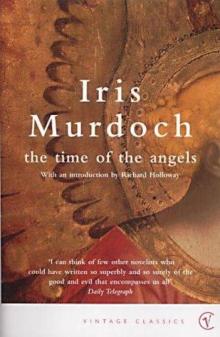 The Time of the Angels
The Time of the Angels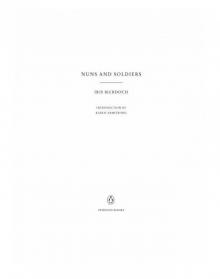 Nuns and Soldiers
Nuns and Soldiers The Green Knight
The Green Knight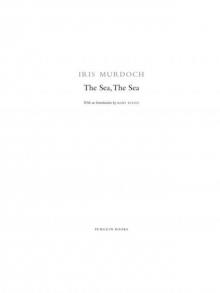 The Sea, the Sea
The Sea, the Sea Sartre: Romantic Rationalist
Sartre: Romantic Rationalist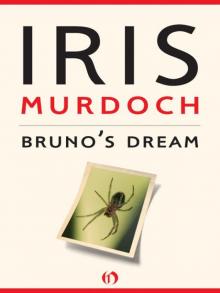 Bruno's Dream
Bruno's Dream An Unofficial rose
An Unofficial rose Sartre
Sartre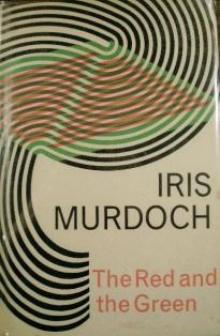 The Red and The Green
The Red and The Green